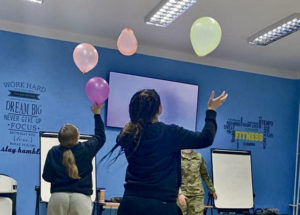
The U.S. Military’s official term for what used to be called “battle fatigue” is Combat and Operational Stress Reaction (COSR). In addition to updated terminology, the U.S. Army also has innovated medical services to address COSRs.
As of May, the Restoration and Reconditioning Center (RRC), developed to help rotational forces manage challenges related to deployment, is available to all service members in the European theater. The three ways to refer to the RRC are through the Chaplain, Behavioral Health Officer, or the Primary Care Manager. Service members referred to the program will arrive to RRCs located in either Landstuhl or Grafenwöhr, Germany, or Zagan, Poland.
COSRs are defined as the physical, emotional, cognitive, or behavioral reactions, adverse consequences, or psychological injuries of service members who have been exposed to stressful or traumatic events in combat or military operations. They are normal responses to extremely abnormal conditions, and are sometimes mistaken for symptoms of mental illness —panic, extreme anxiety, difficulty concentrating, depression and even hallucinations. However, COSRs are not considered a mental health disorder. It is not the same thing as Posttraumatic Stress Disorder, which is a diagnosed condition.
“Restoration and reconditioning are two separate operations,” said Maj. Ashley Welsh, 254th Medical Detachment, Combat and Operational Stress Control (COSC), 30th Medical Brigade. “This RRC program developed by the 254th COSC embeds features from both operations to meet the specific needs of the RAF (Regionally Aligned Forces) Soldiers deployed throughout Atlantic Resolve as well as assigned permanent party across Europe,” said Maj. Welsh.
Restoration services focus on rebuilding unit cohesion and facilitating the building of service members’ confidence in their leaders and themselves. In comparison, reconditioning may be considered an extension of restoration. The 254th RRC is a highly structured, five day program that provides psychoeducational classes (education about situations or conditions that cause psychological stress) and functional skill building activities in a group setting.
The RRC includes 24 classes with functional activities that cover topics ranging from anger management, effective communication and healthy relationships to conflict resolution. The RRC is 100% voluntary for service members and intended for those who have the capacity to Return to Duty (RTD).
CW2 Chelsea Keith, 50th RSG, went through the program in May.
“I participated to hit the emotional reset button,” she said. She wanted a refresher on coping skills and to learn new techniques for communication and conflict resolution. “In short, working to become the best version of myself.”
Keith cited the physical practice of mindfulness through yoga, meditation, journaling, breathing and muscle relaxing techniques as among the most helpful aspects of the program. Overall, she says the program delivered more than she expected.
“I do think it made me a better Soldier, in the sense that by being a better human being, able to cope, and handle things before they become issues, I am a better asset to the Army.
“[This program] is for anyone who wants to better themselves, not just in soldiering but for their family back home too,” Keith added.
According to Capt. Shelley Aurand, 254th Medical Detachment, COSC, 30th Medical Brigade, the program takes a comprehensive “whole person” approach.
“Our goal is to address the work, relationship, family, and/or psychological stressors early on by equipping the Service Member with psychoeducational tools and functional activities that directly target the four domains of social, occupational, psychological and physical health, she said. “When a person is healthy in these four domains, it preserves the fighting strength of the individual and helps the unit remain fully mission capable.”
The COVID-19 pandemic and related travel and social restrictions have fueled demand for behavioral health services. “When I deployed to Afghanistan with a COSC unit in 2014, our Restoration program focused on more combat and operational-related issues,” said Maj. Welsh. “These new RRC programs are geared towards addressing the needs of service members operating within peacetime deployments and in overseas garrison assignments.”
A significantly increased number of Service Member referrals for behavioral health concerns over the past year and a half indicate the RRC program is essential. “Many service members here in Germany are away from home for the first time, overseas for the first time, and are struggling with COVID-19-imposed lockdowns causing new and increased levels of stress. The RRC’s goal is to help teach them new coping skills and implementation strategies to address those stressors head on. This program has the potential to mitigate long-term behavioral health conditions,” said Maj. Welsh.
“Our RRC programs are geared towards those people who are stressed out and it is beginning to affect their life, their work, their relationships,” she added.
“Let’s learn some ways to cope. We want them to return to duty. We want to keep them in the fight.”
For more information on the RCC program, contact a Restoration OIC:
Kaiserslautern:
Maj. Ashley Welsh,
ashley.m.welsh3.mil@mail.mil
Grafenwöhr:
Maj. Kristin de Guzman,
kristin.a.deguzman.mil@mail.mil
Zagan, Poland:
CPT Shelley Aurand,
shelley.c.aurand.mil@mail.mil







